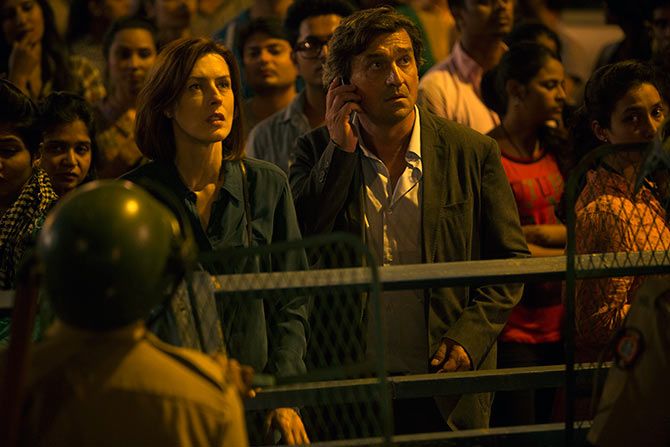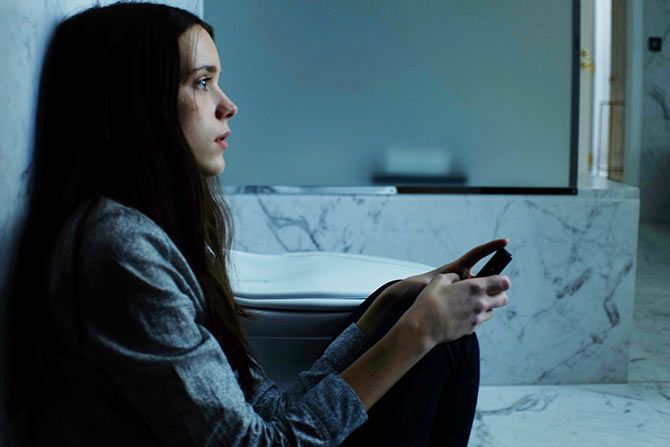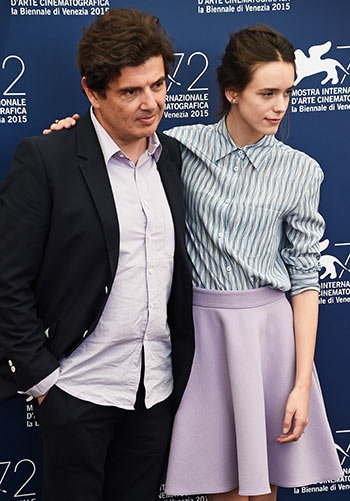'The city was never the same after the attack. It was scarred,' says Nicolas Saada whose movie Taj Mahal offers a unique view of the Mumbai attacks.

Frenchman Nicolas Saada started out as a film journalist and later, transitioned to filmmaking, directing a number of shorts.
His feature debut Taj Mahallooks at the events of the 26/11 terrorist attack on Mumbai's Taj Mahal Palace Hotel, but from the perspective of a young woman who is a guest at the hotel with her parents.
On the night of the attack, the young girl (Stacy Martin) stays alone in her room while her parents go out for dinner. She is trapped in the room while the terrorists are moving from floor to floor killing guests and hotel employees.
Taj Mahal's story isn't its only India connection.
Producer Guneet Monga (of Shikhya Entertainment and Anurag Kashyap Films Pvt Ltd) is an executive producer on the film.
Taj Mahal had its world premiere at the Telluride Film Festival, and later travelled to the Venice International Film Festival.
The initial reviews -- from Variety and Hollywood Reporter -- have not exactly been favourable.
Rediff.com contributor Aseem Chhabra met Saada on his 50th birthday in Telluride, Colorado, the day after the film's premiere.
Saada seemed a bit low because of the reviews, but was more than willing to speak about the making of the film in Mumbai.
Nicolas, had you been to India before? Or did you just follow the Mumbai attacks like everyone else around the world?
I had been to New Delhi 25 years ago. It was a life-changing experience.
I was there to cover the international film festival for a magazine. I decided on that trip that I would try and spend time with people. I knew little about Indian cinema. I only knew Satyajit Ray.
And you use Satyajit Ray's music in your film -- the ending piece from Apur Sansar.
Yes. During the stay, I met Mani Kaul and G Aravindan. I had intense discussions with them about cinema.
I visited the Taj Mahal in Agra. I remember carrying a jacket with me during the trip. Everyone was laughing at me in Paris that I was bringing a tweed jacket to Delhi.
But it was in January and it was very cold. I was the only person in the delegation to have a warm piece of clothing. On the day I left, I looked at my label and it read Taj Mahal Tailors, Hong Kong.
You had bought the jacket in Paris?
Yes. Piyush Shah, who was Mani Kaul's DOP (Director of Photography), said, 'This is a sign. You will return to India for a specific reason.' I forgot about that story completely.
When I heard about the Mumbai attacks, I was so shocked, I kept looking at the news on television and reading about it. I was struck by the fact that a country like India should be hit by an attack of that level.
After that, I met some friends at a dinner party who told me about their niece who had been trapped in the hotel during the attack.
She had survived that experience. I thought it was an incredible story to tell the world. But I didn't want to make the film about the attacks. I wanted to make the film about this girl.

That's what I wanted to ask you. There were quite a few documentaries soon after the attacks. But yours is the first fictional story.
I hope people won't be too disappointed because I think they might expect that the film is about the attacks.
It's a film about how the attacks affected someone who was totally isolated during the experience and she was unable to understand what was going on around her.
So is this story very similar to the young girl's in the film?
It was almost faithful 85 percent of the time.
I interviewed a few couples, who survived as they went through various rooms and floors of the hotel during the attack.
But your character only stays in the room, which is even more frightening.
It is frightening. How did you perceive Stacy Martin's performance?
I thought she was very good. We feel the fear by looking at her face. When the phone rings and she is hiding next to the toilet. It was scary.
That was the idea. It's not like she is going all over the place or she is panicking.
Tell me one thing. Did you shoot the film inside the Taj Mahal Palace Hotel?
It was shot on a soundstage outside Paris.
It looked so real, I was so convinced I was inside the hotel.
Most of the money went into building the set. We also did a lot of CGI extensions -- the corridors of the hotel. Almost two-third of the budget went into the design.
You did shoot some scenes on the streets of Mumbai.
Yes. We were also allowed to shoot the facade of the Taj hotel. We were allowed to shoot for a whole day and the deserted Gateway of India at night, looking at it from the hotel.
So you did take the camera inside the Taj?
No, we were on a crane right at the edge of the Taj.
You did ask them to shoot the film inside, right?
Yes, and they didn't let us shoot it there.
But you were able to bring your production designer inside the hotel and take photographs.
Yes, we went there for a few days. We looked around and took notes. We tried to think about how to recreate a similar space on a soundstage in a different country. It took three months to build it.
So for how many days did you shoot in India?
We were in India for a month and shot for 18 days.
That's where Guneet Monga must have helped you.
Guneet was the key partner because she knew how to help us obtain all the permissions. And she helped us catch the delicate moments of Mumbai's city life.
Well, she used to be a line producer.
It is very complicated to shoot on the streets of Mumbai. We worked with extras in the Ballard Estate and Horniman Circle (South Mumbai).
Parts of the Horniman Circle building looked like the Taj, so we were able to match that and walk around it.
Was it a good experience shooting in India?
It was a great experience because India has a strong film culture and that allowed me to have young and passionate partners. And they were extremely insightful and helpful.
The attacks on Mumbai are an important part of the lives of the people of the city. The extras you used were aware of the film's story line?
Oh, they knew what we were doing.
And they knew it was the first film of its kind. We were eager to be respectful of how this event impacted India and how important it is in the recent history of the country.
It completely changed the mood of the city. The city was never the same after the attack. It was scarred.
You don't mention the politics of the attack.
No, because it is from the young girl's point of view.

Americans have a tendency to forget world politics very easily. How many of them will remember who the attackers were or that they came from Pakistan or the India-Pakistan issues?
I think they know. I think the awareness of global terrorism permeates everything that is in the film. Maybe those who don't know about the tensions between India and Pakistan will just think about the attack as part of the global war on terrorism that we are going through right now.
It's true that the attackers came from Pakistan and they were linked to one of the major wings of Al Qaeda.
Your characters also don't talk about the politics of the attack. The girl at the end only wants to connect with someone else who has been through the same experience.
Well, she is shell-shocked since she has gone through a war-like experience. And her parents cannot fully empathise with her. They were not in the hotel with her when the attacks happened.
Was there a concern about how people in India might react to it?
I don't know how they will react. Do you think they will react to it harshly?
I don't know. But I can tell it will be difficult to get theatrical distribution in India because a lot of the film is in French and foreign language films become an issue.
But maybe because I had followed the events closely as a journalist, I could feel the tension in the second half of the film.
This is what has disappointed me about the negative reactions to the film.
I tried to be as accurate and realistic as possible, as close as possible to this girl's experience of what she went through and what was happening inside the hotel and its surroundings.
I read a lot of material and met a lot of people.
It is true that accuracy can sometimes be unspectacular or different from what people fantasise. But I wanted to be true to the story and not exploit this girl's situation.









